The first project to receive the OBEL AWARD – a new international architecture award – is the Art Biotop Water Garden by Junya Ishigami & Associates. Situated at the foot of the Nasu mountain range in Tochigi, Japan, the carefully crafted, man-made landscape appears as a dreamlike flooded forest.
According to the jury, Ishigami’s extraordinary garden design resets the boundaries between architecture, landscape architecture, art and environment and demonstrates how to interact with nature in a respectful way.
The OBEL AWARD is now collaborating with Aedes Architecture Forum to give more people the chance to experience Ishigami's highly poetic landscape. The exhibition takes place in both of Aedes’ large halls, and visitors will be able to enjoy drawings, photos and videos in safe surroundings.
»An important part of the vision of the OBEL AWARD is to spark debate about the role of architecture in a changing world. This is why we are delighted to collaborate with Aedes Architecture Forum and to benefit from their 40 years of experience as an independent institution working to promote architectural discourse globally. With this collaboration, we hope that the vision and the themes of the OBEL AWARD will be communicated to a wider audience.«
Christen W. Obel, chairman of the Henrik Frode Obel Foundation
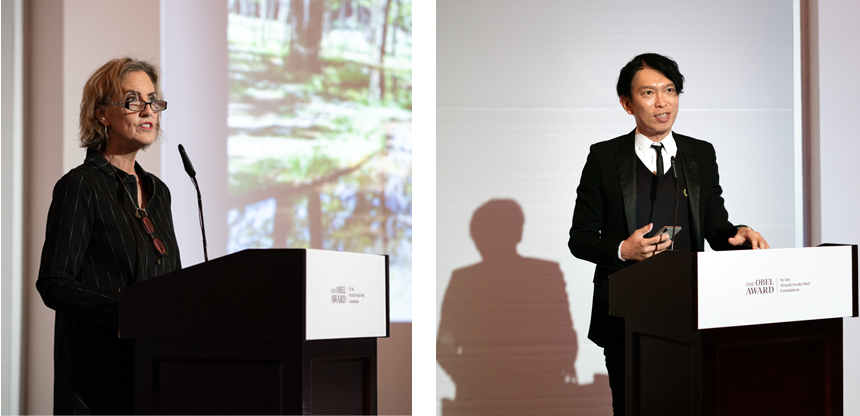
Martha Schwartz, Chair of the jury | Junya Ishigami ©Emilie Koefoed
The OBEL AWARD is a new international prize for architecture that honours recent outstanding architectural contributions to human development all over the world. The award offers an incentive to architects worldwide to consider their obligations towards the common good.
The OBEL AWARD is presented annually and given to realised works or projects inaugurated within the past five years. The award-winning projects can range from manifesto to master plan and include buildings, landscape projects and exhibitions. The award winner receives a prize sum of 100,000 € and a sculpture designed by an outstanding artist.
The OBEL AWARD is administered by the Henrik Frode Obel Foundation, endowed by Danish businessman Henrik Frode Obel (1942-2014).
Link: obelaward.org
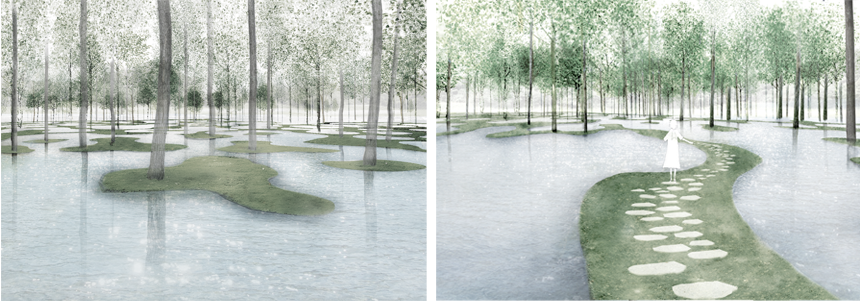
Drawings by Junya Ishigami
Art Biotop Water Garden, Tochigi, 2013-2018
The Water Garden, designed by Junya Ishigami & Associates, is a new outdoor extension of the existing Art Biotop Nasu, an artist retreat in Tochigi, Japan.
The unusual landscape is formed of 318 trees, uprooted from an adjacent construction site and replanted around 160 artificial ponds of different sizes and shapes. A carpet of moss surrounds the ponds, and stepping stones create a carefully choreographed path system through the flooded forest space.
»From the start, if was not so much about creating something from nothing — but more about using the already existing environment and letting the passage of time create a new garden. If things created by humans should function next to natural things, the passing of time is necessary,« explains Junya Ishigami.
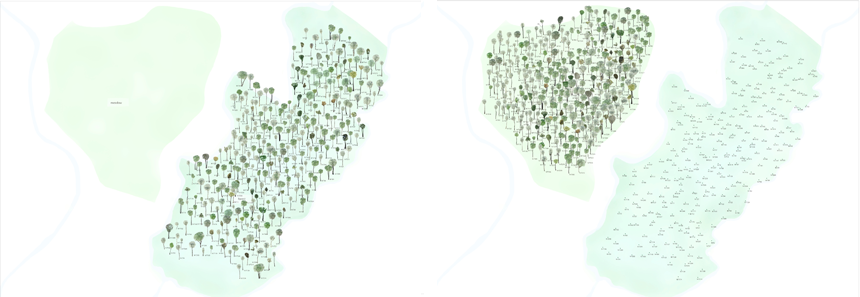
Drawings by Junya Ishigami
Ishigami proposed relocating the forest it in its entirety instead of cutting it down to make space for the construction of a new hotel complex. Each individual tree was described, measured and numbered, before being moved and placed at the adjacent site, a former paddy field, according to Ishigami’s design.
Utilising the existing irrigation system for the paddy field made it possible for the tree species, which do not thrive in wetland areas, to coexist with the countless ponds. All the ponds are interconnected through underground pipelines, diverting water to and from a nearby stream. Thus, through the careful reorganisation of four main elements – trees, water, moss and stones – an alternative man-made landscape, never to be found in nature itself, was created.
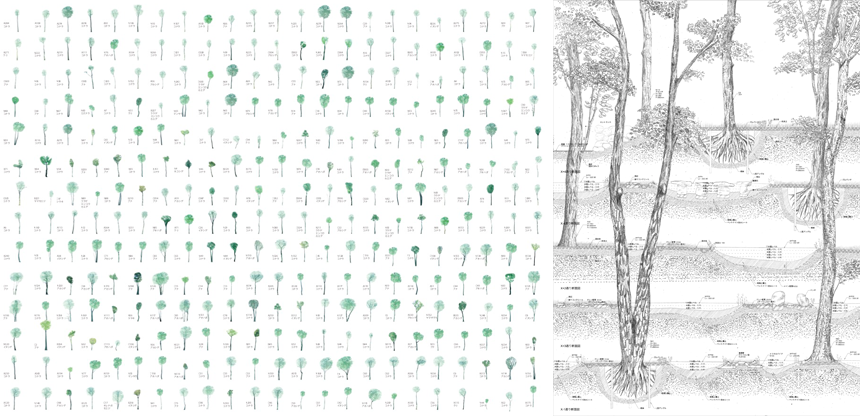
Drawings by Junya Ishigami
By reproducing natural environments, the Water Garden suggests a possible harmonious coexistence between nature and humankind in the future; in the same breath, it questions how we, as human beings, relate to our natural environment, our perception of nature, the role and use of technology, and humankind’s intervention in and manipulation of eco-systems.
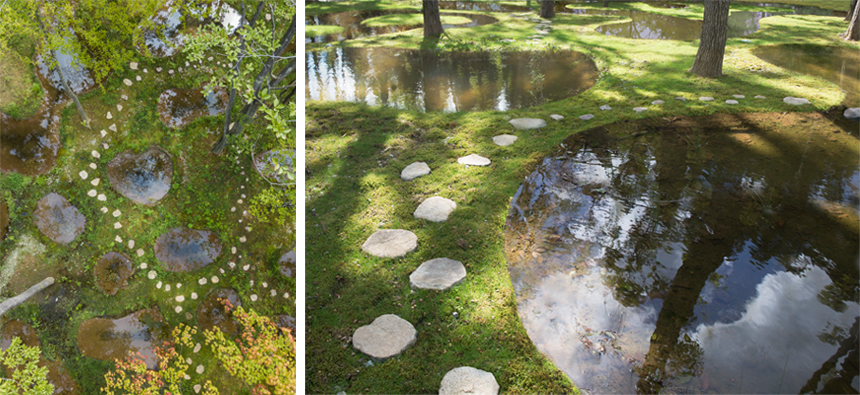
Water Garden ©nikissimo Inc.
Jury statement, 2019 OBEL AWARD
With its deliberate composition of natural elements, the man-made landscape Art Biotop Water Garden resets the boundaries between architecture, landscape architecture, art and environmentalism.
The garden is at once a highly artificial landscape, carefully modelled and dependent on technological artefacts, and an undeniably natural and living organism that grows and changes by its own inherent dynamics. In this way, the garden intermingles different time-spaces: a presence of former, existing and future layers of landscapes. But although it is a large-scale and rather invasive project involving, as it does, the relocation of an entire forest tree by tree, Junya Ishigami makes evident what great respect and care for the environment means.
Ishigami’s approach relies in large part on emotions and sensations and is based on the context and the qualities of the landscape. The result is a landscape full of beauty and atmosphere — a highly poetic space that strongly influences the emotions of the visitor.
With the project, Ishigami invites professionals within the fields of architecture and visitors alike to foster a greater appreciation for the environment and to understand our relationship to it, but also to act with imagination, bravery and respect. The project demonstrates how we can interact with and make our imprint on nature without destroying it. In this sense, the Art Biotop Water Garden is a seminal contribution to the fields of architecture.
www.obelaward.org
CV Junya Ishigami
Born in 1974 in the Kanagawa prefecture in Japan, Junya Ishigami is part of the young generation of Japanese architects that emerged in the 2000s. Educated at the Tokyo University of the Arts, Junya Ishigami started his career as an architect with the SANAA agency before founding Junya Ishigami & Associates in 2004. His work was quickly recognised for its originality and awarded numerous prizes. Among his large-scale projects are the construction in 2008 of the Kanagawa Institute of Technology (KAIT Workshop), an exceptional building on account of its lightness and the continuity it provides between the interior and exterior; the restoration and transformation into a museum garden of the Moscow Polytechnic Museum in 2011; and the 2019 Serpentine Pavilion in London’s Hyde Park, a gravity-defying light structure in black slate and shaped as the wing of a bird.
Aedes Catalogue
An Aedes catalogue will be published.
English, 10€
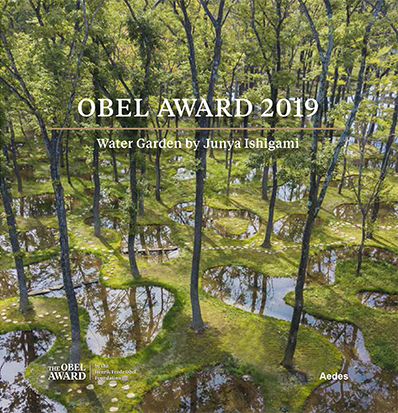
Partner and sponsors
The Obel Award, The Japan Foundation, The Scandinavia-Japan Sasakawa Foundation, Fondation Cartier, Louisiana Channel
